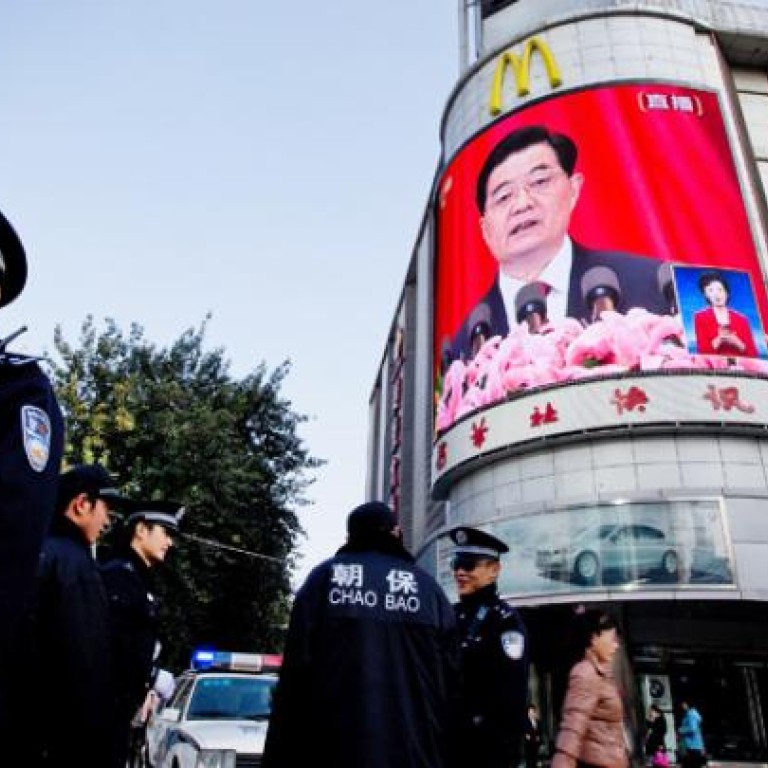
China signals more active role in world affairs
China’s four-point plan for Syria is a rare foray into international mediation for the rising power, a sign that Beijing’s increasingly global economic interests can trump its traditional hands-off diplomacy.
Outgoing President Hu Jintao, in his agenda-setting report this week at a Communist Party gathering to choose the coming decade’s leadership, signaled China’s intent to step out more on the world stage.
Hu said China would “get more actively involved in international affairs, play its due role of a major responsible country,” while underlining Beijing’s deep sensitivity to matters of sovereignty and its rejection of “any foreign attempt to subvert the legitimate government of any other countries.”
China’s foreign minister introduced the plan for a political solution to the Syria conflict to UN-Arab League special envoy to Syria, Lakhdar Brahimi, during his visit to Beijing last week.
It calls for a phased, region-by-region cease-fire; the appointment of representatives to negotiate a political resolution while maintaining “the continuity and effectiveness of Syria’s governmental institutions”; international support for Brahimi’s efforts; and steps by the international community to ease the country’s humanitarian crisis.
The UN has welcomed the effort, but there hasn’t been much international discussion of it. Observers have found it vague and likely aimed at bolstering China’s reputation following criticism of its moves to join Russia in blocking UN resolutions aimed at ending Syria’s bloodshed, including calls for Syrian leader Bashar Assad to step down.
China’s proposal leaves open the possibility of Assad staying on in a power-sharing agreement, and does not significantly add to past peace plans that have failed.
“But then this statement isn’t so much about setting forward a concrete proposal for action as about the messaging that underpins it,” said Sarah Raine, a consulting fellow for Chinese foreign and security policy at the International Institute for Strategic Studies. “It has become increasingly clear that Beijing is worried about the reputational damage its relative intransigence on Syria has been doing to other important relationships, in particular in the Middle East.”
The 20-month crisis in Syria pitting Assad’s government forces against a fractured opposition has so far defied the trend of other Arab Spring uprisings that have seen authoritarian leaders ousted, exiled or killed. Assad is determined to stay in power and has vowed never to leave Syria, leaving world leaders to look for a solution.
If Assad was to step down, “China will surely accept that,” said Li Weijian, a Middle East studies scholar at the Shanghai Institute for Foreign Studies. However, “China believes it’s not up to the international community to judge the legitimacy of the government or the leader of a country.”
China’s move may be mostly about improving its standing in the Middle East, where it is a major buyer of petroleum – not from Syria, but from countries such as Saudi Arabia and Iran.
In recent decades, China has kept a low-profile in global affairs, abiding by a policy of non-interference in the affairs of other countries. Having used the military against its own citizens in 1989 and facing accusations of ethnic oppression in Tibet and Xinjiang, China is wary of approving any interventions that might set precedents for intervention in its own affairs.
“Nonetheless they are realising you can’t just say you can’t interfere,” said Roderic Wye of London-based think tank Chatham House. “There are consequences in the real world for people living in countries and China is beginning to realise China needs to take account of that.”
Li, the Shanghai-based scholar, said he sees no contradiction in China’s principle of non-intervention and playing a bigger role on the world stage.
“Non-intervention doesn’t mean paying no attention,” he said. “On the one hand, we should adhere to the non-inference policy. On the other hand we want to play a bigger role in international affairs as a big responsible country. Sometimes, it’s hard to differentiate between the two things.”
